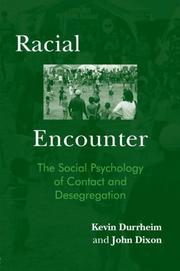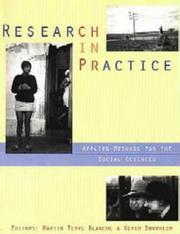| Listing 1 - 8 of 8 |
Sort by
|

ISBN: 0415305322 Year: 2005 Publisher: London : Routledge,
Abstract | Keywords | Export | Availability | Bookmark
 Loading...
Loading...Choose an application
- Reference Manager
- EndNote
- RefWorks (Direct export to RefWorks)
The political and legislative changes which took place in South Africa during the 1990s, with the dissolution of apartheid, created a unique set of social conditions. As official policies of segregation were abolished, people of both black and white racial groups began to experience new forms of social contact and intimacy for the first time. By examining the processes of intergroup contact which arose in South Africa following the removal of official ethnic divides, and supporting it with evidence from the US, Racial Encounter offers a social psychological account of desegregation. It begins with a critical analysis of the traditional theories and research models used to understand desegregation: the contact hypothesis and race attitude theory. It then proceeds by considering and analysing every day discourse, as central to an individual's conception and management of relationships and as a key site of ideological resistance to social change. This book will be of interest to social psychologists, students of intergroup relations and all those interested in post-apartheid South Africa
Race relations --- Segregation --- Post-apartheid era --- Intergroup relations --- Ere post-apartheid --- Psychological aspects --- South Africa --- Afrique du Sud --- Relations raciales --- Sociale psychologie --- Psychological aspects. --- sociale interactie --- Race relations. --- sociale interactie. --- Sociale interactie.

ISBN: 0203715098 1283883880 1135648328 9781135648329 9780203715093 0415305322 9780415305327 9781135648398 9781135648466 9781138876897 1135648395 Year: 2005 Publisher: London New York Routledge
Abstract | Keywords | Export | Availability | Bookmark
 Loading...
Loading...Choose an application
- Reference Manager
- EndNote
- RefWorks (Direct export to RefWorks)
The political and legislative changes which took place in South Africa during the 1990s, with the dissolution of apartheid, created a unique set of social conditions. As official policies of segregation were abolished, people of both black and white racial groups began to experience new forms of social contact and intimacy. By examining these emerging processes of intergroup contact in South Africa, and evaluating related evidence from the US, Racial Encounter offers a social psychological account of desegregation. It begins with a critical analysis of the traditional theories an
Race relations --- Segregation --- Post-apartheid era --- Intergroup relations --- Conflict, Intergroup --- Intergroup conflict --- Relations, Intergroup --- Social interaction --- Desegregation --- Race discrimination --- Minorities --- Integration, Racial --- Race problems --- Race question --- Relations, Race --- Ethnology --- Social problems --- Sociology --- Ethnic relations --- Racism --- Psychological aspects. --- South Africa --- Race relations.
Book
ISBN: 1108383688 1108345557 1108421377 9781108383684 1108381766 Year: 2019 Publisher: Cambridge : Cambridge University Press,
Abstract | Keywords | Export | Availability | Bookmark
 Loading...
Loading...Choose an application
- Reference Manager
- EndNote
- RefWorks (Direct export to RefWorks)
Qualitative Studies of Silence brings together influential qualitative researchers from across the social sciences and humanities who have sought to understand the power of what remains unsaid, both psychologically and socially. Each chapter identifies one or more signs of silence and explains how these can form the basis of a rigorous qualitative investigation. The authors also demonstrate how silences operate in our private and collective lives by fulfilling psychological, relational, institutional, and ideological functions. The book contains multiple disciplinary perspectives and presents analyses of wide-ranging topics, such as medical consultations, whistleblowers, silence in court, omission-as-propaganda, trauma survivors, the silence of war museums, racism in the Americas, gendered silences, paid domestic labour, the undocumented student movement, and the Nazi past. This collection shows how such qualitative studies can reveal and contribute to understanding the unsaid as social action.
Silence --- Social sciences --- Noise --- Social aspects. --- Political aspects. --- Methodology.
Book
ISBN: 0702171875 Year: 2006 Publisher: Cape Town : London : University of Cape Town Press ; Global [distributor],
Abstract | Keywords | Export | Availability | Bookmark
 Loading...
Loading...Choose an application
- Reference Manager
- EndNote
- RefWorks (Direct export to RefWorks)
Social sciences --- Social sciences --- Sciences sociales --- Sciences sociales --- Research. --- Methodology. --- Recherche --- Méthodologie
Multi
ISBN: 9781108345552 9781108421379 9781108432207 Year: 2019 Publisher: Cambridge Cambridge University Press
Abstract | Keywords | Export | Availability | Bookmark
 Loading...
Loading...Choose an application
- Reference Manager
- EndNote
- RefWorks (Direct export to RefWorks)
Book
ISBN: 0367223694 103204957X 9781032049571 9780367223694 Year: 2022 Publisher: London, England: Routledge,
Abstract | Keywords | Export | Availability | Bookmark
 Loading...
Loading...Choose an application
- Reference Manager
- EndNote
- RefWorks (Direct export to RefWorks)
"This handbook explores prejudice, stereotyping and discrimination primarily as phenomena embedded in the social organization of societies and connected to structural factors and larger societal systems. It offers a unique critical, and cross-disciplinary approach to the study of contemporary manifestations of prejudice, stereotyping, and discrimination. New socio-psychological analyses of the most pressing social problems of our age bring into view future directions of research on prejudice, stereotyping and discrimination oriented to social change and collective action, and that engage with wider systems of norms, and discourse. The editors draw on social psychology, sociology, social policy, clinical psychology, cultural studies, and feminist, antiracist and decolonizing social science to show how social psychology can successfully rekindle its intellectual dialogue with kindred social science fields to create broader foundations for the exploration of the paradoxes lodged at the heart of the social expression of prejudice in liberal democracies, that devalue and exclude people. This is essential reading for anyone interested in prejudice, discrimination and stereotypes. The handbook will be accessible to academics and researchers interested in both the quantitative and qualitative study of discrimination, inequality and social exclusion, as well as students undertaking masters or doctoral studies in social psychology, political psychology and political science"--
Stereotypes (Social psychology) --- Prejudices --- Discrimination --- Social change

ISBN: 1919713352 Year: 1999 Publisher: Cape Town : University of Cape Town Press,
Abstract | Keywords | Export | Availability | Bookmark
 Loading...
Loading...Choose an application
- Reference Manager
- EndNote
- RefWorks (Direct export to RefWorks)
Social sciences --- Social sciences --- Methodology. --- Research.
Book
ISBN: 9781869141998 Year: 2011 Publisher: Scottsville University of KwaZulu-Natal Press
Abstract | Keywords | Export | Availability | Bookmark
 Loading...
Loading...Choose an application
- Reference Manager
- EndNote
- RefWorks (Direct export to RefWorks)
| Listing 1 - 8 of 8 |
Sort by
|

 Search
Search Feedback
Feedback About UniCat
About UniCat  Help
Help News
News